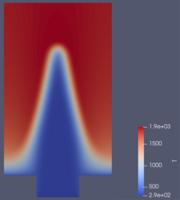STORM - Stability predictions in Thermoacoustic systems through Order Reduction Modelling
by Aswathy Surendran, Moritz Merk, Naman Purwar and Wolfgang Polifke
Thermoacoustics is a multi-physics and multi-scale problem that involves hydrodynamics, acoustics, chemical reactions, mixing and transport of mass, momentum, species and energy (also entropy) as well as the feedback mechanism between acoustics, unsteady heat release rates and hydrodynamics. This feedback can lead to instabilities that are characterised by high amplitude pressure oscillations that be catastrophic to combustion units.
We are already working on a holistic approach for thermoacoustic instability predictions through the use of Linearised Reactive Flow (LRF) equations where the LNSE and linearized reacting species equations are solved simultaneously and therefore the flame-acoustic-flow coupling is inherent and an external FTF is not required. In addition to this, Project STORM looks into the effect of heat loss through Conjugate Heat transfer in burner-stabilised flames. We will now include linearised conjugate heat transfer equations along with the LRF equations, to build a monolithic solver framework.
Such a formulation to predict the thermoacoustic instability behaviour of combustion systems will be an useful tool in designing combustion units like domestic boilers where burner-stabilised flames drive the thermoacoustic instability.

Acknowledgement


Project STORM is financially supported by the EuroTech Postdoc Programme (Marie Curie), which is co-funded by the European Commission under its framework programme Horizon 2020. Grant Agreement number 754462.